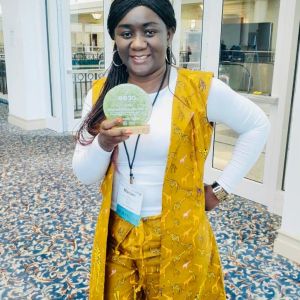
Mariam Kabamba
National coordinator
Congo Environnement et Nature
Lubumbashi,
Roles at NAAEE
Languages
Interests
Read More
Lubumbashi, Democratic Republic of the Congo
2020 EE 30 Under 30 Changemaker Grant Project
Urban reforestation and environmental education in 40 schools across Lubumbashi
Working with schools in Lubumbashi, DRC, an area largely degraded due to mining and population growth, the project will engage students in urban reforestation and educational activities about climate change, the impact of deforestation, and effective practices for planting, monitoring, and caring for trees. The schools will plant both fruit trees and copper-resistant species, and to foster student ownership the project will form student environmental committees in each school to help lead their educational and reforestation activities.
**********
EE 30 Under 30 Biography
Mariam works to blend education and reforestation in the Congo Basin.
Tell us about yourself!
I was born and raised in Lubumbashi, Democratic Republic of the Congo (DRC), and I am the foundress and national coordinator of Congo Environnement et Nature (CEN), an NGO working for environmental protection in the DRC.
At CEN, I launched a project integrating environmental education and reforestation in different schools across city of Lubumbashi, as deforestation is one of the main contributors to carbon emissions and climate change in the DRC. With this project, we chose to work with students since they have the greatest potential to drive sustainability for future generations and to change the mindset of people in the DRC. We use a practical education approach where the students are directly involved with reforestation, and become champions within their school. Their involvement ensures that their stewardship sticks with them for much longer than if they were to just listen to a lesson without direct involvement.
I hold a Bachelor’s in Geology from the University of Lubumbashi, and a Bachelors’s in Environmental Management from the University of South Africa. In 2009, I started to work as a voluntary road mender as part of a project to clean the city of Lubumbashi. From 2010 to 2012, I then led public relations for the movement, Ecological Forum of Young Congolese, which created by university students in the sciences.

My interest in the environment started when I was in high school, when I noticed how the environment in my country is not manged well and how people can suffer as a result. There are many cases of diseases linked to mining activities and other unsanitary conditions, including respiratory diseases, birth defects, cholera, malaria, typhoid fever, and diarrhoea.
The DRC owns half of Africa’s forests and water reserves, but we have an alarming rate of deforestation, species depletion, heavy metal pollution, and land degradation. All of these contribute to the global problem of climate change, as you can see in DRC’s major cities such as Lubumbashi, Kinshasa, and Goma.
Climate change specifically affects farmers in my community, and increases poverty as many people cultivate their land for a living. My father, who is disabled, stopped cultivating his land when the nearest dam dried up due to rising temperatures and changes in weather patterns. This is what pushed me to start taking action, and I moved from being a geologist to become an environmental manager.
I then founded CEN, and through my work realised that if we don’t work to change peoples’ mentalities and don’t teach the younger ones, then we are working for nothing. This pushed me to reorient my objectives to really focus on environmental education and public awareness.
What advice would you give to the next generation of leaders that are looking to bring about positive change in their communities through EE?
Youth engagement in environmental education efforts is essential for achieving the Sustainable Development Goals, and for averting the worst threats to sustainable development. Young people are enthusiastic, motivated, and innovative, and when empowered they can take great actions and be excellent leaders for today and tomorrow.
My advice to the next generation is:
- Always work to touch others’ lives, as we live to serve.
- Work hard, and be humble, patient, and respectful to others. Don’t waste your energy with negative thoughts. With passion, humility, and determination, you can achieve your goal.
- Connect and partner with others to help achieve great results. Don’t be selfish. Share your ideas with others, and be ready to learn from others every day.
- Dream big and don’t let anyone discourage you. Always believe in yourself and don’t give up when something goes wrong.
- Don’t wait for big support and big actions. Start small – the sum of small actions will result in big actions.
My last advice is to my dear African women. You are the future leaders. Although women and children are the most vulnerable to environmental disasters, they are also the most instrumental in combating climate change. So, stand tall and take action, keeping in mind that to “educate a woman is to educate a nation!’’

Every time I read the quote of the late South African president Nelson Mandela about education I get more inspired: “Education is the most powerful weapon you can use to change the world.” I strongly believe that environmental education is the most effective tool to combat environmental destruction, as education is a long process that will impact an infinite number of future generations.
I am motivated when I see children feel empowered to take action to keep their environment clean. There is always a solution for every problem, and that is why I’m hopeful for the future.
What pro-environmental behavior do you think would make a big impact if everyone in the world started doing it?
Planting at least 12 trees per year. Trees are vital – they give us oxygen, store carbon, stabilise the soil, and give life to the world’s wildlife. The also provide us with the materials for tools and shelter. Whether as a family project or an individual one, the point is to plant.
